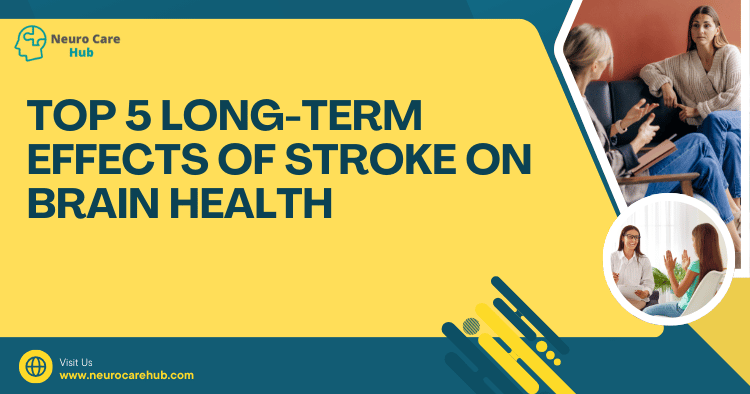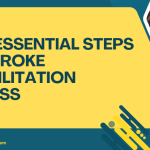Table of Contents
- Introduction
- 1. Cognitive Impairment
- 2. Emotional Changes
- 3. Physical Disabilities
- 4. Communication Challenges
- 5. Risk of Future Strokes
- Conclusion
- FAQs
Introduction
A stroke can be a life-altering event, not just for the individual but also for their loved ones. This sudden disruption in blood flow to the brain can have profound long-term effects on brain health and overall quality of life. Understanding these effects is crucial for recovery and rehabilitation. In this article, we will explore the top five long-term effects of stroke on brain health, providing insights and guidance to navigate this challenging journey.
1. Cognitive Impairment
One of the most significant long-term effects of a stroke is cognitive impairment. This can manifest in various ways, including difficulties with memory, attention, and problem-solving skills. According to the American Stroke Association, up to 30% of stroke survivors experience cognitive decline, often referred to as post-stroke cognitive impairment (PSCI).
“Cognitive impairment can feel like a fog that clouds everyday life.”
Key Points:
- Memory Loss: Survivors may struggle to recall recent events or learn new information.
- Attention Deficits: Difficulty maintaining focus can complicate everyday tasks.
- Executive Functioning: Challenges in planning, organizing, and decision-making can hinder independence.
Resources:
For more in-depth information, visit the American Stroke Association.
2. Emotional Changes
Experiencing a stroke can lead to a myriad of emotional changes. Survivors often face feelings of depression, anxiety, and frustration as they adjust to their new reality. The brain damage caused by a stroke can affect the areas responsible for emotional regulation, making it challenging to cope with these feelings.
“Emotional recovery is just as important as physical recovery.”
Key Points:
- Depression: Studies suggest that nearly one-third of stroke survivors may experience depression.
- Anxiety: The fear of another stroke or anxiety about changes in life can be overwhelming.
- Emotional Lability: Some may find themselves laughing or crying unexpectedly due to a condition known as pseudobulbar affect (PBA).
Tips for Coping:
- Seek Professional Help: Counseling and therapy can be beneficial.
- Join Support Groups: Connecting with others who share similar experiences can provide comfort and understanding. For additional insights on the importance of emotional support, check out Top 5 Benefits of Support Groups for Neurological Patients.
3. Physical Disabilities
Stroke can lead to a range of physical disabilities, depending on the area of the brain affected. These disabilities can impact mobility, coordination, and overall physical health, making daily activities more challenging.
“Every small victory in rehabilitation is a step towards independence.”
Key Points:
- Paralysis: Many stroke survivors experience some form of paralysis on one side of the body, known as hemiplegia.
- Muscle Weakness: Even without complete paralysis, survivors may have weakened muscles, affecting their ability to perform tasks.
- Difficulty with Coordination: Fine motor skills may be impaired, making activities like writing or buttoning a shirt difficult.
Rehabilitation:
Rehabilitation is essential for recovery. Physical therapy can help improve strength, coordination, and mobility. Here’s a simple table summarizing types of therapies that can aid recovery:
| Type of Therapy | Focus Area |
|---|---|
| Physical Therapy | Strength and mobility |
| Occupational Therapy | Daily living skills |
| Speech Therapy | Communication and swallowing |
4. Communication Challenges
Communication can become a struggle for many stroke survivors, particularly those who have suffered a stroke in the left hemisphere of the brain, where language skills are primarily located. This can lead to conditions like aphasia, which affects a person’s ability to express or understand language.
“Finding new ways to communicate can be a journey of patience and creativity.”
Key Points:
- Aphasia: This condition can range from mild difficulty finding words to complete inability to communicate.
- Dysarthria: Muscle weakness can lead to slurred speech, making it hard for others to understand.
- Social Isolation: Communication barriers can lead to feelings of isolation and frustration.
Solutions:
- Speech Therapy: Engaging in speech therapy can help improve language skills.
- Use of Technology: Apps and devices designed for communication can offer support. For more resources on effective communication strategies, see 5 Ways Caregivers Support Neurodegenerative Patients.
5. Risk of Future Strokes
After experiencing a stroke, the risk of having another stroke increases significantly. Factors such as high blood pressure, diabetes, and heart disease can contribute to this risk. It’s essential for survivors to understand these risks and take proactive steps to mitigate them.
“Preventing a second stroke requires vigilance and lifestyle changes.”
Key Points:
- Lifestyle Changes: Adopting a healthy diet, exercising regularly, and quitting smoking can reduce the risk.
- Regular Check-Ups: Ongoing medical care and monitoring of health conditions are crucial.
- Medication Adherence: Taking prescribed medications as directed can help manage risk factors. For more on lifestyle changes that can support brain health, refer to Top 5 Lifestyle Changes for Better Neuro Health.
Resources:
For more information on preventing future strokes, visit CDC Stroke Prevention.
Conclusion
Understanding the long-term effects of stroke on brain health can empower survivors and their families to seek the help and resources needed for recovery. While the journey may be challenging, many stroke survivors lead fulfilling lives with the right support and rehabilitation. Remember, it’s never too late to seek help and make positive changes.
FAQs
What is the most common long-term effect of a stroke?
Cognitive impairment is one of the most common long-term effects, affecting memory, attention, and executive functions.
Can stroke survivors recover fully?
While some individuals may experience significant recovery, others may face ongoing challenges. Rehabilitation and support play a critical role in maximizing recovery.
How can family members support a stroke survivor?
Family members can help by providing emotional support, assisting with daily tasks, and encouraging participation in rehabilitation activities.
What are the signs of a stroke?
Common signs include sudden numbness or weakness, confusion, difficulty speaking, and severe headache. Remember the acronym FAST: Face drooping, Arm weakness, Speech difficulties, and Time to call emergency services.
By understanding these long-term effects and taking proactive steps, stroke survivors can work towards a healthier and more fulfilling life. For further insights on neuro care and brain health, explore our resourceful articles at Neuro Care Hub.






